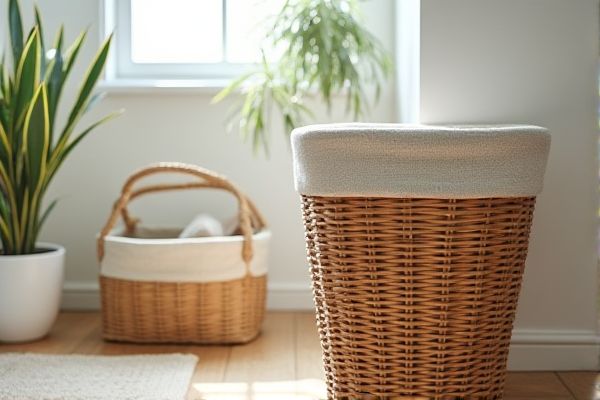
Wicker baskets offer a natural, eco-friendly alternative to plastic baskets, providing durability and aesthetic appeal for home storage and decor. Discover how choosing between these materials can impact your environment and lifestyle by reading the rest of the article.
Table of Comparison
| Feature | Wicker Basket | Plastic Basket |
|---|---|---|
| Material | Natural fibers (rattan, willow) | Durable synthetic plastic |
| Durability | Moderate, prone to wear and breakage | High, resistant to impact and weather |
| Weight | Lightweight | Light to moderately heavy |
| Environmental Impact | Biodegradable, eco-friendly | Non-biodegradable, less eco-friendly |
| Maintenance | Requires gentle cleaning and drying | Easy to clean and maintain |
| Cost | Generally higher due to craftsmanship | Usually lower and mass-produced |
| Appearance | Natural, rustic aesthetic | Variety of colors and designs |
| Use Cases | Home decor, light carrying, gift baskets | Household storage, outdoor use, heavy-duty carrying |
Introduction to Wicker and Plastic Baskets
Wicker baskets, crafted from natural materials like rattan, willow, or bamboo, offer durability, breathability, and an eco-friendly option for storage and decor. Plastic baskets provide lightweight, water-resistant, and easy-to-clean alternatives, often featuring vibrant colors and varied designs suitable for versatile uses. You can choose between the natural aesthetic and sustainability of wicker or the practicality and affordability of plastic based on your specific storage needs.
Material Comparison: Wicker vs Plastic
Wicker baskets, crafted from natural materials such as rattan, bamboo, or willow, offer sustainability, biodegradability, and a classic aesthetic, while plastic baskets are composed of synthetic polymers like polypropylene or polyethylene, providing superior durability, water resistance, and ease of cleaning. The porous structure of wicker allows for breathability but may be prone to damage from moisture and pests, whereas plastic baskets resist mold, are lightweight, and often budget-friendly. Choosing between wicker and plastic depends on the intended use, maintenance preference, and environmental considerations regarding biodegradability and recyclability.
Durability and Longevity
Wicker baskets offer natural durability with flexibility that resists cracking but may deteriorate over time when exposed to moisture and sunlight. Plastic baskets provide superior longevity due to their resistance to water, chemicals, and UV rays, making them ideal for heavy-duty and outdoor use. Choosing your basket depends on whether you prioritize eco-friendly aesthetics or long-term durability.
Environmental Impact
Wicker baskets are made from natural, biodegradable materials like rattan or willow, offering a lower environmental footprint compared to plastic baskets, which are derived from petroleum and can take centuries to decompose. Plastic baskets contribute to pollution through microplastics and hazardous waste in landfills, whereas wicker baskets break down naturally and can often be composted. Choosing wicker baskets helps reduce plastic waste and supports sustainable resource use, making your choices more eco-friendly.
Aesthetics and Design Options
Wicker baskets offer a natural, rustic aesthetic characterized by intricate weaving patterns and organic textures, making them ideal for decorative purposes and artisanal appeal. Plastic baskets provide a wide range of colors, shapes, and customizable designs, suitable for modern, vibrant, or utilitarian styles. Both materials cater to distinct design preferences, with wicker emphasizing traditional craftsmanship and plastic excelling in versatility and mass production.
Practical Uses in Daily Life
Wicker baskets are ideal for storing lightweight items such as fruits, vegetables, and small household goods, offering breathability and a rustic aesthetic that complements home decor. Plastic baskets provide durability, water resistance, and easy cleaning, making them practical for laundry, outdoor storage, and transporting heavy or wet items. While wicker baskets excel in dry environments and decorative purposes, plastic baskets dominate in versatility and long-term maintenance across various daily tasks.
Maintenance and Care Requirements
Wicker baskets require regular dusting and occasional cleaning with a damp cloth to prevent dirt buildup and maintain their natural finish, while avoiding prolonged exposure to moisture to prevent mold and damage. Plastic baskets offer effortless maintenance, as they can be easily wiped down with soap and water, resist stains, and dry quickly without risk of deterioration. For your home organization, choosing plastic baskets reduces upkeep time, while wicker baskets need more attentive care to preserve their aesthetic appeal.
Cost and Affordability
Wicker baskets generally cost more upfront due to the craftsmanship and natural materials involved, making them a durable but higher-priced option compared to plastic baskets. Plastic baskets offer greater affordability, often priced lower and widely available, making them suitable for budget-conscious shoppers. Your choice depends on weighing initial cost against long-term value and aesthetic preference.
Health and Safety Considerations
Wicker baskets are crafted from natural materials that are biodegradable and free from harmful chemicals, reducing exposure to toxins commonly found in some plastic baskets. Plastic baskets may contain BPA or phthalates, which pose potential health risks, especially when used for food storage. Proper cleaning and maintenance of wicker baskets can prevent mold growth, while plastic baskets require regular inspection for cracks that can harbor bacteria.
Which Basket is Right for You?
Wicker baskets offer natural breathability, eco-friendly materials, and a classic aesthetic ideal for decorative storage or light-duty use, while plastic baskets provide durability, water resistance, and easy maintenance suitable for heavy-duty tasks or outdoor settings. Consider the intended use: wicker baskets excel in organizing linens, toys, or small household items in dry environments, whereas plastic baskets withstand moisture, rough handling, and frequent cleaning. Choosing between wicker and plastic baskets depends on balancing environmental impact, durability needs, and the specific storage context to determine the best fit for your lifestyle.
 homyna.com
homyna.com